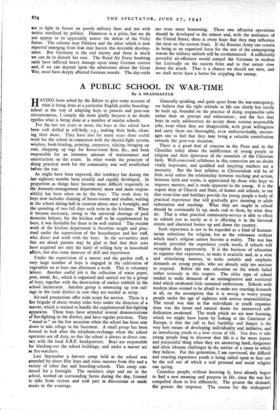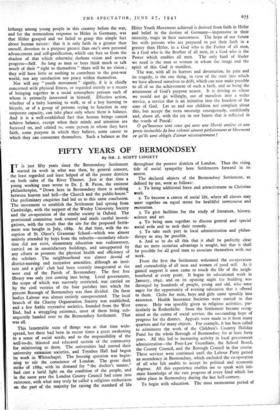A PUBLIC SCHOOL IN WAR-TIME
By A HEADMASTER
HAVING been asked by the Editor to give some account of what is being done at a particular English public boarding- school in the way of adapting boys to present and post-war circumstances, I comply the more gladly because it no doubt typifies what is being done at a number of similar schools.
For the last ten years or more, the boys at this school have been well drilled in self-help, e.g., making their beds, clean- ing their shoes. They have also for many years done useful work for the school in connexion with the electric-light system, wireless, book-binding, printing, carpentry, tidying, bringing up coal, chopping up logs for house-room fires, &c., and been responsible for an immense amount of maintenance and construction on the estate. In other words the principle of doing practical work for the community was well established before the war.
As might have been expected, this tendency has during the last eighteen months been steadily and rapidly developed. In proportion as things have become more difficult (especially in the domestic-management department) more and more respon- sibility has been taken on by the boys. The work done by boys now includes cleaning of house-rooms and studies, waiting in the school dining-hall in rotation about once a fortnight, and the spending of two full days each term in the kitchens. When it became necessary, owing to the universal shortage of paid domestic helpers, for the kitchen staff to be supplemented by boys, it was desirable for them to be well trained. The routine work of the kitchen department is therefore taught and prac- tised under the supervision of the housekeeper and her staff, who direct and work with the boys. In the servantless days that are ahead parents may be glad to find that their sons have acquired not only the habit of willing help in household affairs, but also some measure of skill and experience.
Under the supervision of a master and the garden staff, a very large number of boys is engaged in the cultivation of vegetables on at least one afternoon a week. This is voluntary labour. Another useful job is the collection of waste paper, pots, metal, &c., which is organised and carried out by a group of boys, together with the destruction of useless rubbish in the school incinerator. Another group is measuring up iron rail- ings in the rural district in case they are needed as scrap.
Air-raid precautions offer wide scope for service. There is a fire brigade of about twenty older boys under the direction of a master, which is trained to handle the supplemented fire-fighting apparatus. These boys have attended several demonstrations of fire-fighting in the district, and have regular practices. They " stand to " on the few occasions when the school has been sent down to take refuge in the basement. A small group has been formed to look after the telephone-exchange when the school operators are off duty, so that the school is always in direct con- tact with the local A.R.P. headquarters. Boys are responsible for blacking-out the school buildings, and under a master act as fire-watchers.
Last September a harvest camp held at the school was attended by about fifty boys and some masters from this and a variety of other day and boarding-schools. This camp con- tinued for a fortnight. The members slept and ate in the school, worked on surrounding farms during the day, listened to talks from visitors and took part in discussions or made music in the evenings. Generally speaking, and quite apart from the war-emergency, we believe that the right attitude to life can slowly but surely be built up, founded on the practice of doing responsible jobs rather than on precept and exhortation ; and the fact that boys in early adolescence do accept these various responsible jobs, even when they are disagreeable, with great willingness and carry them out thoroughly, even enthusiastically, encour- ages one to feel that they may bring a valuable contribution towards the post-war situation.
There is a good deal of concern in the Press and in the Churches today about the indifference of young people to religion and their ignorance of the essentials of the Christian faith. Well-conceived syllabuses in this connexion are no doubt vitally important, and qualified and inspiring teachers are a necessity. But the best syllabus in Christendom will be of little avail unless the relationship between teaching and action, between faith and works, is appreciated by those who hope to improve matters, and is made apparent to the young. It is the urgent duty of Church and State, of homes and schools, to see that term-time and holidays provide for young people a body of practical experience that will gradually give meaning to adult exhortation and teaching. What they are taught in school should be continually lit up, made real to them, by what they do. That is what practical community-service is able to effect in schools just as surely as it is effecting it in the battered streets and shattered homes up and down the country.
Such experience is not to be regarded as a kind of humani- tarian substitute for religion, but as the substance without which man's religion cannot become a reality. The war has already provided the experience youth needs, if schools will recognise their opportunity. It is the business of education to organise that experience, to make it available and, in a wise and stimulating manner, to make suitable and emphatic demands on young people, who are already only too anxious to respond. Before the war education on the whole failed rather seriously in this respect. The older type of school tended to make demands of an unimaginative and restricted kind which awakened little sustained enthusiasm. Schools with modern ideas seemed to be afraid to make any exacting demands at all, on the assumption that it is wrong to worry young people under the age of eighteen with serious responsibilities. The result was that in few individuals or youth organisa- tions was the latent and natural desire for unreserved self- dedication awakened. The truth which we are now learning, which we might have learnt by looking at the Continent of Europe, is that the call to face hardship and danger is the very best means of developing individuality and initiative, and so introducing youth to a new vision of life. Nor does it take young people long to discover that life is a far more joyous and purposeful thing when they are answering hard, dangerous and often irksome challenges in the service of a cause in which they believe. For this generation, I am convinced, the difficult and exacting experience youth is being called upon to face can be the soil out of which a real personal and social religion can spring.
Countless people, without knowing it, have already begun to find a new meaning and purpose in life, since the war has compelled them to live differently. The greater the demand, the greater the response. The reason for the widespread lethargy among young people in this country before the war, and for the tremendous response to Hider in Germany, was that Hider grasped and we failed to grasp this simple fact about human nature: that it is only faith in a greater than oneself, devotion to a purpose greater than one's own personal advancement and self-gratification, which can free us from the shadow of that which otherwise darkens vision and arrests progress—Self. So long as men or boys think much or talk much of their " right to themselves " there will be no vision ; they will have little or nothing to contribute to the post-war world, nor any satisfaction nor peace within themselves.
Nor will any " youth movement " signify, if it is chiefly concerned with physical fitness, or regarded merely as a means of bringing together in a social atmosphere persons each of whom is primarily interested in himself. Effective action, whether of a baby learning to walk, or of a boy learning to bicycle, or of a group of persons trying to function in any corporate capacity, can take place only where there is balance. And it is a well-established fact that human beings cannot achieve balance, except when their minds and attention are focussed on, and related to, some person in whom they have faith, some purpose in which they believe, some career to which they can consecrate themselves. Such a balance as the Hitler Youth Movement achieved is derived from faith in Hider and belief in the destiny of Germany—impressive in their intensity, tragic in their narrowness. The hope of our future lies with persons who are prepared to put their faith in a greater than Hitler, in a God who is the Father of all men, in a God who is the Brother of all men, in a God who is the Power which enables all men. The only kind of leader we need is the man or woman in whom the image and the spirit of this God is manifest.
The war, with all its horrors and devastation, its pain and its tragedy, is the one thing, in view of the state into which we have allowed ourselves to drift, which can now make possible to all of us the achievement of such a faith, and so bring the attainment of God's purpose nearer. It is driving us where we would not go willingly, out of ourselves into a wider service, a service that is an initiation into the freedom of the sons of God. Let us and our children not complain about this, but accept the stern necessity courageously, confidently and, above all, with the joy in our hearts that is reflected in the words of Pascal: 0 qu'heureux sont ceux qui avec une liberte entiere et une pente invincible de leur volonte aiment par faitement et librement cc qu'ils sont obliges d'aimer necessairement























 Previous page
Previous page